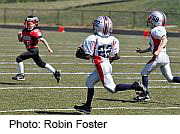
FRIDAY, Aug. 21, 2015 (HealthDay News) — Playing tackle football before the age of 12 may be linked to brain changes seen in pro football players who developed memory and thinking problems later in life, new research suggests.
“It makes sense that children, whose brains are rapidly developing, should not be hitting their heads over and over again,” said lead author Julie Stamm, who conducted the study as part of her doctoral dissertation at Boston University’s Center for the Study of Traumatic Encephalopathy.
“This study supports that idea and suggests that there may be later-life consequences associated with experiencing these repeated hits during childhood,” said Stamm, who is now a postdoctoral researcher in radiology at the University of Wisconsin School of Medicine and Public Health.
However, the current study could not prove a cause-and-effect relationship between playing football at a young age and the brain changes seen later in life. It only showed an association between these factors.
One expert not involved with the research said it adds to growing evidence of potential risk for young players.
“This study is not strong enough to allow a parent to determine that the evidence supporting a ‘no football for my kid’ approach is wise,” said Dr. Marie Csete, president and chief scientist at Huntington Medical Research Institutes in Pasadena, Calif. “But taken together with other studies, that kind of decision is looking smarter and smarter.”
The study was published this month in the Journal of Neurotrauma.
In April, a federal district court judge approved a $765 million settlement between the National Football League and more than 5,000 players who had accused the league of hiding the dangers of concussions for years. But many former players are unhappy with terms of the agreement and have filed appeals.
In the study, Stamm and her colleagues evaluated 40 retired NFL players. Half of the players had started playing tackle football before turning 12 and the other half at age 12 or older. All participants had recently experienced at least six months of problems with memory and thinking. Both groups had similar rates of concussions, the researchers said.
The players who participated are part of the DETECT (Diagnosing and Evaluating Chronic Traumatic Encephalopathy using Clinical Tests) study, funded by the U.S. National Institutes of Health. DETECT recruited retired NFL players who played professionally for at least two years. They were between 40 and 65 years old.
Using a special type of MRI, the investigators focused on connections in the corpus callosum, the area of the brain that bridges the two brain halves, the researchers explained.
These connections were less intact in the NFL players who began their tackle football careers before age 12, the researchers found. The implication is that repeated hits to the head during a critical period of brain development might lead to disruptions that permanently change the brain’s structure, Stamm said.
The corpus callosum goes through a period of fast development between the ages of 8 and 12, she explained.
Csete added that the corpus callosum shows “dramatic changes” during adolescence. “The work lends more evidence that delaying sports where repetitive head injury is common is probably a good idea,” she said.
Csete pointed out that the study is somewhat limited by the small number of NFL players involved. Another possible limitation is that interpretation of the specialized MRI used in the study has “not yet been perfected,” she said. In addition, she said that while the authors show evidence of structural changes, this study doesn’t link those changes to brain function.
The study is “still a cautionary tale,” Csete said, “Another one in the accumulating story about head injury in kids representing a serious problem.”
Csete also asked the question that’s likely uppermost in any parent’s mind: “What does the study mean for the much more common scenario of a kid that plays some football through high school and not beyond?”
Stamm noted that sports participation carries “so many important benefits for children, including the development of leadership skills, social skills and work ethic,” along with the health benefits.
That said, she added, “Research suggests that incurring repeated head impacts can lead to long-term consequences, and we should be doing what we can at all levels in all sports to minimize repeated hits.”
Csete agreed that avoiding repetition seems to be key. Repeated mild traumatic brain injuries in a short time frame can magnify their effects over the long term, she said.
“Until the rules of football and the culture around it change, kids will be at risk for brain injury,” she said. “‘Protective’ gear will not solve the problem alone.”
More information
To learn more about football injury prevention, visit the American Academy of Orthopaedic Surgeons.
Copyright © 2026 HealthDay. All rights reserved.

